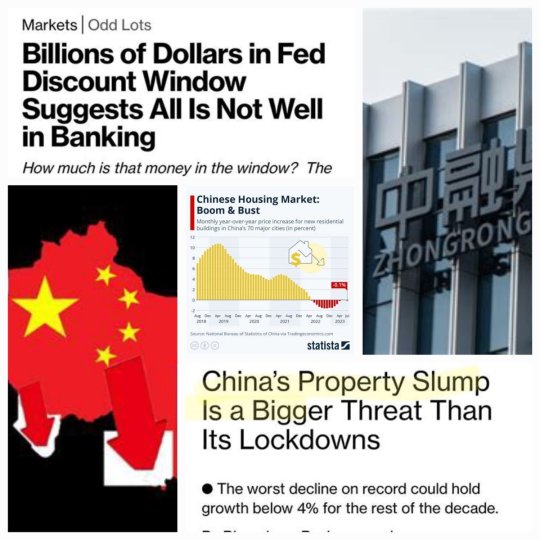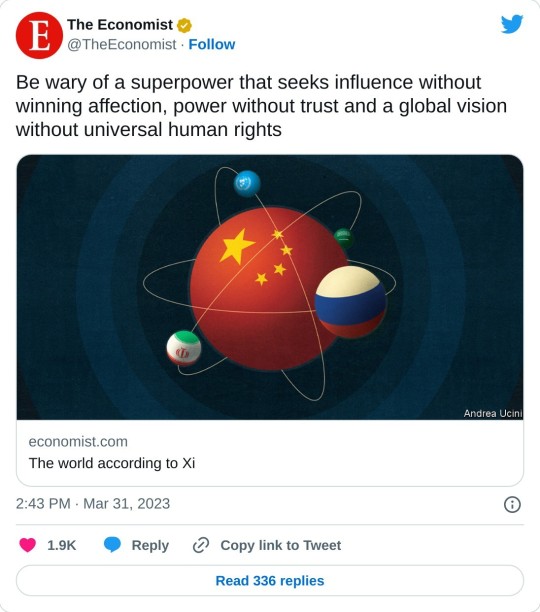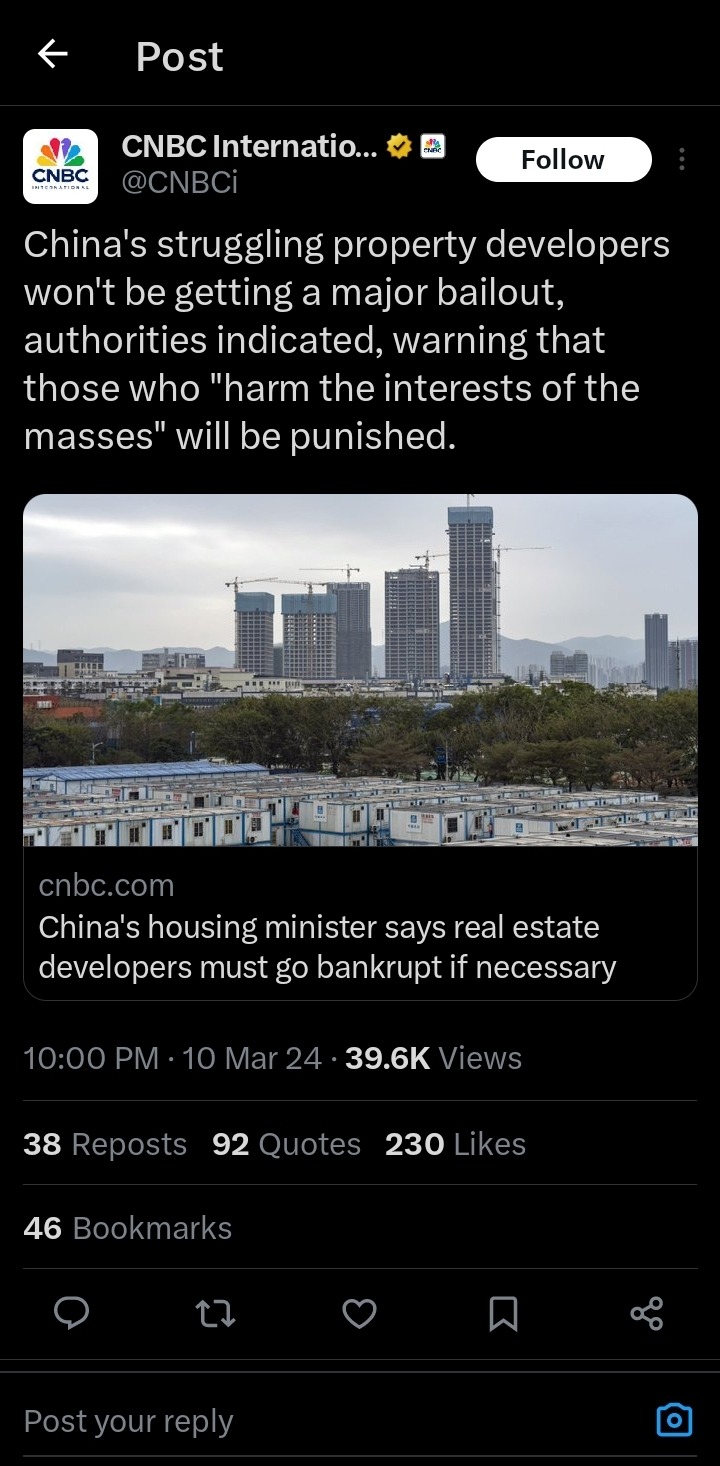#China US debt
Text
The $10 Trillion Bombshell: Russia's "Encouragement" to Attack NATO and Israel's Major Downgrade
In the blog post’s introduction, it showcases the staggering impact of Russia’s covert tactics in the geopolitical arena, particularly in relation to NATO’s vulnerability and Israel’s significant decline. As the clock continues ticking, the explosive nature of this $10 trillion bombshell reveals itself, shedding light on the extent of Russia’s “encouragement” to attack. One cannot underestimate…
View On WordPress
#brics#china dumping us bonds#China US debt#de-dollarization#dollar#dollar crisis#economic news#Fed rate cut#gold#inflation crisis#investing news#Israel bonds#Israel debt downgrade#Israel downgrade#Israel economic crisis#Israel economy#Russia NATO#sean foo#treasury bills#Trump NATO#Trump Russia#us bonds#us debt#us debt crisis#us dollar#US economy#us treasuries#us treasury collapse#us treasury crisis#us treasury dump
0 notes
Text

the ccp 😭 like genuinely who are they preforming for here by honoring Toriyama’s passing….. the Japanese? they don’t like them because of ww2 and in current affairs Japan is allied with American interests. There’s no way they’re preforming for the western world because they genuinely don’t care about soft power like Korea or Japan does
#you can use this argument for the stuff that Chiba is building and funding in other countries - that seems to be their choice to gain power#politically. by basically getting countries into debt with them (monetarily and like making them have gratitude to the gov)#but like there’s not really a reason I could see for this to be a polical play internationally#it’s more of a politics within china because tons of chinese citizens grew up with dragon ball…. it’s literally journey to the west#gwon#sorry I’m done
5 notes
·
View notes
Text
Biased Reporting
— Vitaly Podvitski | October 13, 2023

Cartoon: Vitaly Podvitski
Losing Steam
— Chen Xia | October 12, 2023

Illustration: Liu Rui/Global Times
#China 🇨🇳#US 🇺🇸#Forever Palestine 🇵🇸#Illegal Regime of Isra-hell 🇮🇱#US Economy | Debt Crisis | Inflation | Strikes#Cartoons#Vitaly Podvitski#Chen Xia
2 notes
·
View notes
Text
The People's Republic of China | United States Trade Representative
Not even taking into account how much US debt China holds (currently 870 billion dollars) and concentrating strictly on trade, I'm not sure why some politicians are so comfortable with the "enemy" rhetoric. Pay off the debt and manufacture/assemble your own products, then you can talk shit. Or as my mom used to say, "Don't let your mouth write a check your ass can't cash."
But we all know how this story will play out: the debt ceiling will likely be raised, as the alternative would create havoc in global financial markets. For more see this article in Foreign Policy.
#us china#foreign policy#us debt#us treasury#us china trade#makes me wonder what all that balloon shit is really about#wag the dog
8 notes
·
View notes
Text
USA versus China now. Based on financials and economy and dollars.
0 notes
Text
They want WWIII as excuse to default
voters discontent on #climate policy,#vax corruption, #nepotism of #EU chief
after #war State #debt,#taxes,#rules never return to pre-levels
#US stop EU invest. with #China
#prices will collapse by 1/3 into line with #incomes, double in #capital markets
https://salvatoremercogliano.blogspot.com/2024/05/they-want-wwiii-as-excuse-to-default.html?spref=tw
#eu chief#discontent#war#state debt#taxes#rules#prices#incomes#capital markets#us#investment#eu#china
1 note
·
View note
Text
Market Update: July 2023
#By Tony Xue#General Manager#Ingredients Online China#It has been three months since our last market update in March and greater challenges are coming to our raw material industry. We must face#Compensatory Consumption (so-called Revenge Spending) does not take place. Governments of all countries are trying to encourage spending by#however#it also leads to a slower economy and high debts including US government deficit and personal debts.
0 notes
Text
Shadows in the Global Economy: Unraveling China's Financial Crisis and the Looming Threats in the US
Shadows in the Global Economy: Unraveling China's Financial Crisis and the Looming Threats in the US #China #ChinaCrisis #GlobalEconomy #ChinaBankingCrisis #ChinaFinancialCrisis #USCrisis
China’s financial woes are escalating as its banks, anticipating significant loan losses, take drastic measures to bolster loan loss reserves by tapping into the bond markets for 30% more funds than the previous year. This predicament stems from the unfolding crisis that began over a year ago when Evergrande, a major property developer, declared its inability to support around $300 billion in…

View On WordPress
#Banking Woes#China#Economic Consequences#Evergrande#Financial Crisis#Financial Stability#Global Finance#regulatory oversight#Shadow Banking#US Hidden Debt
0 notes
Text
Chinese Trade Lifeline Rescues Argentina Amid Deepening Currency Collapse
Amid Argentina’s deepening currency collapse, a lifeline emerges in the form of Chinese trade. The resilience of this trade partnership has played a crucial role in rescuing the South American nation from the grips of economic turmoil. With their vast resources and unwavering support, China has stepped in as Argentina’s savior, providing much-needed stability amidst the chaos. This blog post…

View On WordPress
#Argentina bonds#Argentina BRICS#Argentina currency crisis#argentina currency devaluation#argentina debt crisis#Argentina inflation crisis#Argentina Javier Milei#Argentina peso collapse#Argentina US dollar#Argentine Peso#brics vs g7#China Argentina#China Argentina swap line#China Argentina trade#China Argentina Trade Tariff#de-dollarization#dollar#dollarization#economic news#gold#inflation crisis#investing news#Peso#recession 2024#sean foo#us dollar#usd
0 notes
Text
Will the Chinese Yuan take over the US Dollar?
As of my last knowledge update in September 2021, the Chinese Yuan (also known as the Renminbi, abbreviated as RMB) was not poised to overtake the US dollar as the world's primary reserve currency. However, the dynamics of global currencies and economic shifts are complex and subject to change.
Several factors would need to align for the Chinese Yuan to potentially challenge the US dollar's dominant position:
Economic Size and Stability: The United States has the largest and most stable economy globally, which has historically been a crucial factor in the dominance of the US dollar. China has seen remarkable economic growth, but it still faces challenges related to financial openness, debt, and currency convertibility.
Currency Convertibility: The Yuan has been subject to capital controls, which means that it has not been fully convertible like the US dollar. China has been gradually relaxing these controls, but complete convertibility is a significant step toward internationalizing a currency.
Market Reforms: China has been making efforts to internationalize its currency by expanding its use in trade agreements and investment. Initiatives like the Belt and Road Initiative have contributed to the increased use of the Yuan in international trade.
Trust and Confidence: The US dollar is considered a stable and trustworthy currency. For the Yuan to challenge the dollar, it would need to build similar levels of trust and confidence among central banks, financial institutions, and businesses worldwide.
Geopolitical Factors: Geopolitical considerations also play a significant role in the use of a currency. The US dollar's status is influenced by the United States' role in global politics and its alliances. China's geopolitical influence is growing, but it faces challenges in achieving the same level of influence.
Financial Infrastructure: The US dollar benefits from a well-developed global financial infrastructure, including the largest and most liquid financial markets. China has been working to improve its financial infrastructure to compete at a global level.
It's important to note that the internationalization of a currency is a long and complex process. While the Chinese Yuan has made strides in becoming more globally prominent, it still has a way to go before it could potentially challenge the US dollar's position as the world's primary reserve currency.
Lastly, the future evolution of global currencies will depend on a variety of economic, political, and financial factors, and it's challenging to predict with certainty. It's advisable to consult up-to-date sources and experts in the field for the most current insights into this matter.

1 note
·
View note
Text

The world according to XiEven if China’s transactional diplomacy brings some gains, it contains real perilsA lesser man than Xi Jinping might have found it uncomfortable. Meeting Vladimir Putin in Moscow this week, China’s leader spoke of “peaceful co-existence and win-win co-operation”, while supping with somebody facing an international arrest warrant for war crimes. But Mr Xi is untroubled by trivial inconsistencies. He believes in the inexorable decline of the American-led world order, with its professed concern for rules and human rights. He aims to twist it into a more transactional system of deals between great powers. Do not underestimate the perils of this vision—or its appeal around the world.On Ukraine China has played an awkward hand ruthlessly and well. Its goals are subtle: to ensure Russia is subordinate but not so weak that Mr Putin’s regime implodes; to burnish its own credentials as a peacemaker in the eyes of the emerging world; and, with an eye on Taiwan, to undermine the perceived legitimacy of Western sanctions and military support as a tool of foreign policy. Mr Xi has cynically proposed a “peace plan” for Ukraine that would reward Russian aggression and which he knows Ukraine will not accept. It calls for “respecting the sovereignty of all countries”, but neglects to mention that Russia occupies more than a sixth of its neighbour.Leaders March 25th 2023The world according to XiCentral banks face an excruciating trade-offThe trouble with Emmanuel Macron’s pension victoryHow the EU should respond to American subsidiesThe machinery, structure and output of the British state need reformAs video games grow, they are eating the media
0 notes
Video
youtube
Whack 4 accounting firms! Xi accelerates the de-coupling from the West/The new Premier tries to stop
China Insights
The new premier saw the aggressive behavior of his top boss, President Xi Jinping, in March of this year and became deeply concerned. By exposing China's financial situation, he hopes that his party leader will understand that China's economy is really struggling and that China still needs to stay connected to the world in order to keep its economy from declining so quickly and to keep government revenues at a workable level. He hopes his top boss, Xi Jinping, will not be so impulsive. But the question is, does Premier Li Qiang, a loyal supporter of China's top leader, Xi Jinping, have that kind of influence?
P.S. The CCP's dictatorship and aggressive foreign policy involving China in the alliance of repressive dictatorial regimes created by the Kremlin will become a very serious problem for China's business growth opportunities in the future. No company in China will be immune from the arbitrariness of CCP officials and the limited and controlled flow of information by government censorship will prevent to obtain a true picture of the state of the economy and business environment.
The Western businessmen and politicians, who invested in the CCP controlled economy since the 1989 Tiananmen Square protests and massacre, were true greed-driven fools...
1 note
·
View note
Text

BEIJING — China’s struggling real estate developers won’t be getting a major bailout, Chinese authorities have indicated, warning that those who “harm the interests of the masses” will be punished.
“For real estate companies that are seriously insolvent and have lost the ability to operate, those that must go bankrupt should go bankrupt, or be restructured, in accordance with the law and market principles,” Ni Hong, Minister of Housing and Urban-Rural Development, said at a press conference Saturday.
“Those who commit acts that harm the interests of the masses will be resolutely investigated and punished in accordance with the law,” he said. “They will be made to pay the due price.”
That’s according to a CNBC translation of his Mandarin-language remarks published in an official transcript of the press conference, held alongside China’s annual parliamentary meetings.
Ni’s comments come as major real estate developers from Evergrande to Country Garden have defaulted on their debt, while plunging new home sales have put future business into question.
In 2020, Beijing cracked down on developers’ high reliance on debt for growth in an attempt to clamp down on property market speculation. But many developers soon ran out of money to finish building apartments, which are typically sold to homebuyers in China ahead of completion. Some buyers stopped paying their mortgages in a boycott.
Authorities have since announced measures to provide some developers with financing. But the national stance on reducing the role of real estate in the economy hasn’t changed.
This year’s annual government gathering has emphasized the country’s focus on investing in and building up high-end manufacturing capabilities. In contrast, the leadership has not mentioned the massive real estate sector as much.
Real estate barely came up during a press conference focused on the economy last week, while Ni was speaking during a meeting that focused on “people’s livelihoods.”
Ni said authorities would promote housing sales and the development of affordable housing, while emphasizing the need to consider the longer term.
Near-term changes in the property sector have a significant impact on China’s overall economy.
Real estate was once about 25% of China’s GDP, when including related sectors such as construction. UBS analysts estimated late last year that property now accounts for about 22% of the economy.
Last week, Premier Li Qiang said in his government work report that in the year ahead, China would “move faster to foster a new development model for real estate.”
“We will scale up the building and supply of government-subsidized housing and improve the basic systems for commodity housing to meet people’s essential need for a home to live in and their different demands for better housing,” an English-language version of the report said.
next time you complain about how things are in America, consider that if you lived in some kind of scary communist country like China, you wouldn't even get to fund a bailout for the real estate company owners who ruined the economy like you can (whether you like it or not) in the good old US of A! 🇺🇲
1K notes
·
View notes
Text
De-dollarization and hatred stronger than common sense
#China refuse to buy $400 bn in #US debt
US don't low interest rates to hit CN #stocks, flood world with #USD & seek #WWIII to cut #debt
7 top #EU banks 2023 #profit in #Russia:3 times more than 2021
US:8 million #migrants live taxpayer-subsidized life
https://salvatoremercogliano.blogspot.com/2024/04/de-dollarization-and-hatred-stronger.html?spref=tw
#china#us debt#refuse#interest rates#stocks#us dollar#wwiii#eu banks#russia#migrants#taxpayer subsidized
0 notes
Text
The last time the US faced a debt fight this bad it lost its AAA rating | CNN Business
The last time the US faced a debt fight this bad it lost its AAA rating | CNN Business
A version of this story first appeared in CNN Business’ Before the Bell newsletter. Not a subscriber? You can sign up right here. You can listen to an audio version of the newsletter by clicking the same link.
New York
CNN Business
—
Democrats and Republicans in Congress are gearing up for yet another political showdown over raising the nation’s $31.4 trillion borrowing limit.
This isn’t…

View On WordPress
#Aaa#apple inc#asia#budget deficits#business#China#companies#company activities and management#continents and regions#debt ceiling#domestic alerts#domestic-business#domestic-international news#domestic-us politics#east asia#economy and economic indicators#economy and trade#europe#federal budget#federal budget deficit#financial performance and reports#financial ratings#Goldman Sachs#Government and public administration#government budgets#government organizations - us#iab-business#iab-business accounting & finance#iab-business and finance#iab-business operations
0 notes
Note
I have a question that’s probably pretty stupid, but I thought I’d ask someone knowledgeable. I know china is nothing like how it’s painted by imperialism, but the “social credit” system that affects people’s lives and privileges is real right? A lot of people online default to it for the argument towards china being terrible in one way or another, and from what I know it seems like a legitimately bad thing used to punish or censor people. Do I have this wrong? I’m sure there’s more to the story
In brief, while the 'social credit system' exists, it's both fairly regional (as lots of things are in China, everywhere is constantly experimenting and trialling different paths), and generally applies only to corporations, and the rich. Western reporting likes to act as though they're talking to fellow rich people, which obfuscates things - when they say 'your social credit score can stop you from getting plane tickets' they mean 'if you've committed acts of embezzlement or corruption you can't get first-class tickets and have to fly economy with everyone else'.
In the vast majority of cases the system is aimed solely at corporations and regards things like not paying social security benefits and the like. China doesn't have a FICO-like credit system as the US does, because most Chinese people aren't debtors. People in China generally don't go into debt to buy things, they save up (because the Chinese economy is based on the sale of production, rather than the sale of debts, like the US economy). Before this system was established there lacked a unified system of punishments for non-criminal corporate violations.
That's why the western businesses, which own the western news outlets, were very upset about this, and painted it as they did. They complain about stricter regulations anywhere, but for China they get to piggyback off of existing sentiment to get people who otherwise would support these types of regulations to oppose them. The 'environmental pollution regulations are tyrannical government overreach' line goes down a lot smoother when people have already bought into a story of 'authoritarianism'.
Here's some reporting from western sources backing this up:
Contrary to common belief, the cities mainly target companies, not individuals. Nonetheless, legal representatives of a violating company are also included in the blacklists to prevent reoffending elsewhere or under a different company. Nationally, about 75 percent of entities targeted by the system end up on blacklists because of court orders they have ignored—the so-called judgment defaulters. The remaining companies are typically collared for severe marketplace violations—for instance, for food safety infringements, environmental damage, or wage arrears.
5K notes
·
View notes